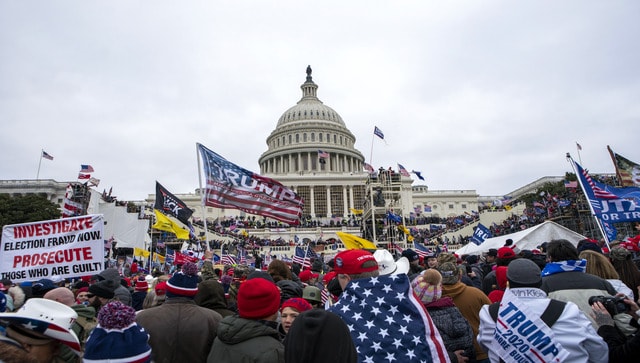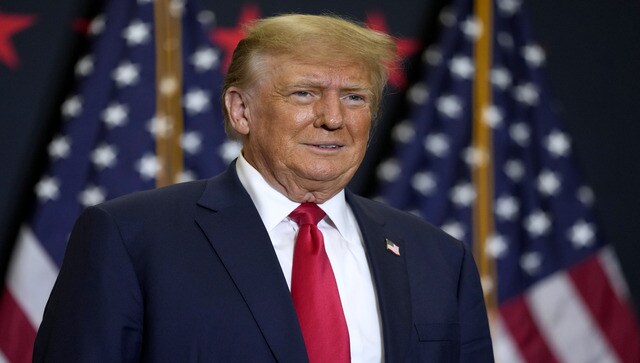What's the 'insurrectionist clause' used by 2 states to remove Trump from ballot?
What's the 'insurrectionist clause' used by 2 states to remove Trump from ballot?

After Colorado’s Supreme Court, a top election official in Maine has now removed former United States president Donald Trump from the state’s presidential primary ballot. Maine’s Democratic secretary of state Shenna Bellows announced the decision on Thursday (28 December) invoking the “insurrectionist ban” in the 14th Amendment of the US Constitution to bar the Republican candidate.
According to USA TODAY, Bellows wrote in her decision that evidence showed that the insurrection “occurred at the behest of, and with the knowledge and support of, the outgoing President (Trump). The US Constitution does not tolerate an assault on the foundations of our government.”
This comes after the Colorado Supreme Court earlier this month ruled that Trump cannot run in that state’s presidential primary as he was involved in the “insurrection” on 6 January 2021 attack on the US Capitol.
What is the ‘insurrectionist ban’ that is being used to disqualify Donald Trump? Can he still run for president? Let’s take a closer look.
What is the ‘insurrectionist ban’?
A rarely used provision of the US Constitution – Section 3 of the 14th Amendment – has been used to bar Donald Trump in Colorado and Maine.
The US ratified the 14th Amendment after the Civil War to guarantee rights to former slaves and more, as per Associated Press (AP). The amendment included Section 3 which was formed to stop secessionists from returning to public office once southern states re-joined the Union, noted BBC.
The provision states: “No person shall be a Senator or Representative in Congress, or elector of President and Vice-President, or hold any office, civil or military, under the United States, or under any State, who, having previously taken an oath, as a member of Congress, or as an officer of the United States, or as a member of any State legislature, or as an executive or judicial officer of any State, to support the Constitution of the United States, shall have engaged in insurrection or rebellion against the same, or given aid or comfort to the enemies thereof. But Congress may by a vote of two-thirds of each House, remove such disability.”
This legislation was used against Confederate president Jefferson Davis and his vice-president Alexander Stephens, but was hardly invoked since, reported BBC.
It was most recently used last year when a county commissioner in New Mexico was removed from office for participating in the 6 January attack on the US Capitol. This was reportedly the first such ruling since 1869.

Arguments for and against the law
Several conservative scholars argue that Section 3 applies to Trump following his efforts to overturn the results of the 2020 election, as per ABC News. The former US president is already facing two separate criminal cases for the attempt to overturn his 2020 loss.
In August, conservative legal scholars William Baude and Michael Stokes Paulsen wrote in a law review paper that Section 3 is “self-executing, operating as an immediate disqualification from office, without the need for additional action by Congress”.
They concluded that Trump could thus be ineligible for election, according to the BBC report.
The case in Colorado was filed by the Citizens for Responsibility and Ethics in Washington (Crew) watchdog group on behalf of six residents of the state. The group is also petitioning top election officials in several other states to kick Trump off the primary ballot.
Dozens of lawsuits before had failed until the Colorado ruling.
The Trump campaign has rejected that the 6 January attack was an insurrection. His lawyers argue that it is unclear whether Section 3 applies to the president. In case it does apply to presidency, they say it is a “political” question that must be left for voters to decide and not unelected judges, reported AP.

Speaking to ABC News, constitutional scholar and political science professor Kevin Wagner said the legal challenge to Trump’s candidacy faces an uphill task partly because of the lack of consensus on whether 6 January was an insurrection.
“The challenge here is that the 14th Amendment isn’t necessarily self-executing. In other words, it doesn’t just automatically happen and there is some question about what it means to be engaged in insurrection or rebellion and how that is defined. The challenge for us is that historically, it hasn’t been well-defined,” Wagner, a professor at Florida Atlantic University, said.
Will it affect Trump’s candidacy?
Both the Colorado and Maine orders are stayed until the ruling of the US Supreme Court on the matter. The former president has already said he would appeal the Colorado ruling before the US Supreme Court.
In 2020, Trump lost Colorado and he does not need to win the state to establish an Electoral College majority next year. He bagged one of Maine’s four Electoral College votes in 2020, so the Maine ruling could have a direct impact in a close fight.
Trump‘s electoral future is in the hands of the US Supreme Court now, which is expected to take the final call on his eligibility for state ballots next year. Notably, the top court has never given a verdict on the meaning of Section 3.
Legal experts say there are little chances for the US Supreme Court to uphold the Colorado court’s ruling. However, if it does, the decision would apply to all states and not just Colorado, effectively ending Trump’s candidacy, as per AP.
Republican primary voters will head to polls within two months and thus the US Supreme Court must take a decision before that. Despite his multiple legal woes, Trump continues to be the dominant frontrunner for the Republican nomination.
“It is imperative for the political stability of the US to get a definitive judicial resolution of these questions as soon as possible. Voters need to know if the candidate they are supporting for president is eligible”, AP quoted Rick Hasen, a law professor at the University of California, Los Angeles, as saying.
With inputs from agencies
What's Your Reaction?



























































